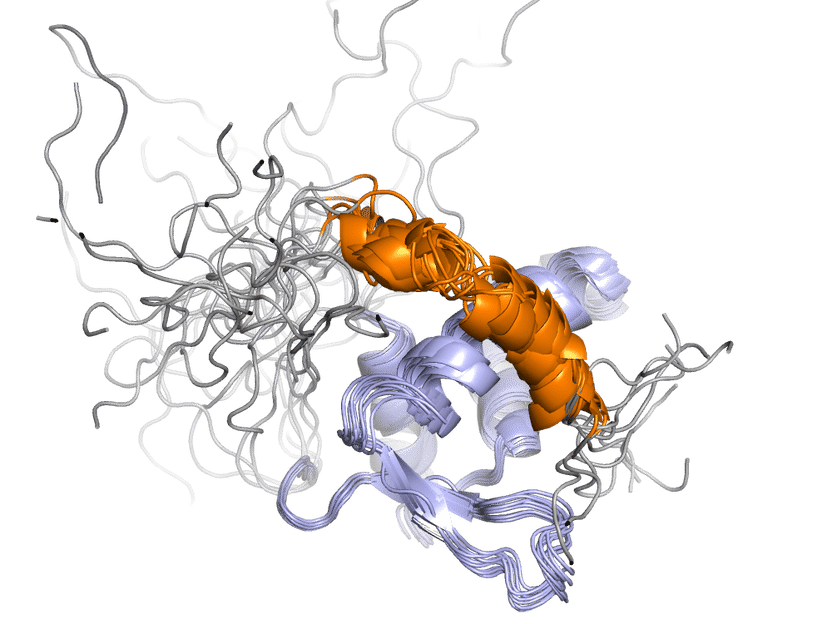Certain proteins determine the life or death of the cell
Scientists at Med Uni Graz research aging cells
Advertisement
Researchers at the Medical University of Graz, together with international colleagues, have investigated which molecular processes in the body are responsible for the regulation of the FOXO4 tumour suppressor and thus determine whether cells proliferate or die, which plays a central role in age-related diseases. The research results were published in "Cell Reports".

NMR structure of FOXO4 in the inhibited state
Med Uni Graz/Madl
Aging and cancer: FOXO4 - a key player
Transcription factors are responsible for controlling gene expression. They enable cells to produce certain proteins. The transcription factors of the FOXO family play an essential role in ensuring the balance of a cell and, depending on the situation, can decide whether cells proliferate or die. Disruptions in FOXO proteins can cause a variety of age-related diseases such as diabetes and cancer. In addition, FOXO proteins play an important role in the healthy aging process in humans. Therefore, in order to obtain new approaches for the treatment of age-related diseases and to better understand the causes of aging, it is important to understand the molecular mechanisms of FOXO protein function and regulation.
In this publication, first author Benjamin Bourgeois and the research group of Tobias Madl at the Gottfried Schatz Research Center of Med Uni Graz were able to elucidate that the regulation of FOXO4, a representative member of the FOXO family, is regulated by the interplay of modifications and a network of interactions.
The international team was able to show that FOXO4 can adopt a self-inhibited state that prevents DNA binding and thereby reduces its activity.
Via this control with β-catenin, the FOXO4 protein and its "family members" can determine whether cells enter programmed cell death, continue to divide or continue to exist as so-called senescent cells in "saving mode". These senescent cells no longer perform their tasks as effectively as their "young and healthy" neighbors and can even lead to permanent inflammatory reactions in the surrounding tissue. Proteins such as FOXO4, which function as tumor suppressors, help eliminate these damaged cells and keep the tissue as a whole healthy
As a result of interaction with the regulatory protein β-catenin, DNA binding is restored and FOXO4 can perform its function as a tumor suppressor. Post-translational modifications regulate the interaction of FOXO4 and β-catenin. The newly gained insights into the molecular mechanisms that regulate and activate FOXO4 allow us to better understand how cells decide between cell division and cell death.
FOXO4-based drugs - on the way to the clinic
In this context, Tobias Madl's group and colleagues in the Netherlands have filed a patent for a FOXO4-based class of drugs. These substances act on a specific "diseased" cell type, the so-called senescent cells, which accumulate increasing DNA damage with age and are the origin of a variety of age-related diseases, by selectively killing these cells. These compounds are currently being further investigated and prepared for clinical application. The new findings on the regulation of FOXO4 contribute to a more precise understanding of the effect of these substances and allow further optimizations for specific clinical applications.
Note: This article has been translated using a computer system without human intervention. LUMITOS offers these automatic translations to present a wider range of current news. Since this article has been translated with automatic translation, it is possible that it contains errors in vocabulary, syntax or grammar. The original article in German can be found here.



























































